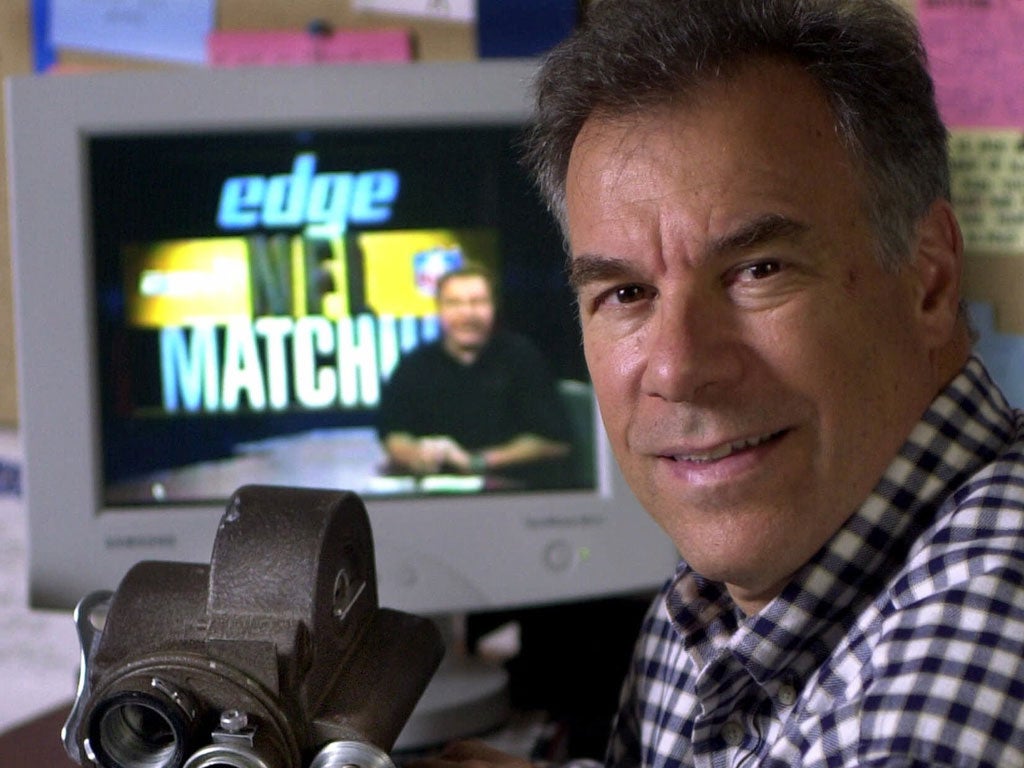Steve Sabol: Film-maker who revolutionised TV sports coverage

Your support helps us to tell the story
From reproductive rights to climate change to Big Tech, The Independent is on the ground when the story is developing. Whether it's investigating the financials of Elon Musk's pro-Trump PAC or producing our latest documentary, 'The A Word', which shines a light on the American women fighting for reproductive rights, we know how important it is to parse out the facts from the messaging.
At such a critical moment in US history, we need reporters on the ground. Your donation allows us to keep sending journalists to speak to both sides of the story.
The Independent is trusted by Americans across the entire political spectrum. And unlike many other quality news outlets, we choose not to lock Americans out of our reporting and analysis with paywalls. We believe quality journalism should be available to everyone, paid for by those who can afford it.
Your support makes all the difference.Half a century ago, pro football (the American version) languished in fourth place among the country's favourite spectator sports. Today, the National Football League has supplanted baseball as the true national TV pastime and become the richest sports league on the planet, with annual revenues of $9bn. For that astonishing success no single individual perhaps was more responsible than Steve Sabol.
Back in 1962, when NFL Films was founded by Steve's father Ed, the game was remote from viewers, hard to understand and with endless breaks in play; in short, not much of a spectacle. NFL Films, of which from the outset the son was the driving creative force, changed that state of affairs – and in the process sports broadcasting around the world.
Sabol swamped the touchlines with cameras, searching for the tiny close-up that makes sporting heroes human. He turned slow-motion into an art form, persuaded coaches and players to wear microphones, put together riveting reels of highlights and bloopers. Narration was provided by the former TV anchor John Facenda, modestly presented as "The Voice of God". If further embellishment was required, it was provided by the music of Tchaikovsky. At a stroke, a game of journeymen was transformed into an epic contest of gladiators locked in bone-crushing combat, a pageant of sweat and blood, triumph and tragedy, that turned the sport's intrinsic violence almost into an art form.
Hollywood itself couldn't have done a better job – indeed many Sabol techniques became part of a studio's box of tricks. Americans simply couldn't get enough football. Ratings soared and money poured in. Sports Illustrated was not exaggerating when it described NFL Films as arguably "the most effective propaganda organ in the history of corporate America."
The breakthrough came in that first year, when Ed Sabol persuaded the League to make his new-fledged enterprise the official videographer for the NFL Championship Game – forerunner of today's Super Bowl – between New York Giants and Green Bay Packers. Soon its material was being used by the networks to enhance their own coverage. NFL Films' estimated revenue now exceeds $50m a year.
Steve Sabol was born for the job. He had been a keen football player during his years at Colorado College, where he made the all-Rocky Mountain Conference team as a running back. That success reflected in part his talent as a player, but also his gifts of self–promotion. He possessed the showy bombast that is part and parcel of today's NFL, once describing himself as "The Prince of Pigskin Pageantry at the Pinnacle of His Power", and adorning himself with the nickname "Sudden Death." He was a graduate in art history to boot, and a huge film fan.
As a skills-set to serve the aggrandisement of the NFL, it could not have been bettered – as his father realised. When Ed Sabol won the rights for the 1962 Championship game, he was quickly on the phone to his 20-year-old son, summoning him to the cause. "All you've done in all your life is play football and go to the movies. You ought to be able to make some contribution."
In later years the Sabols were showered with accolades and awards. "We see the game as art as much as sport," Steve told the Associated Press as his father was inducted into the Pro Football Hall of Fame in 2011, the same year he himself was diagnosed with inoperable brain cancer. "That helped us nurture not only the game's traditions but to develop its mythology."
Rupert Cornwell
Steven Douglas Sabol, sports film-maker: born Moorestown, New Jersey 2 October 1942; married Penny Ashman (one son); died Moorestown 18 September 2012.
Join our commenting forum
Join thought-provoking conversations, follow other Independent readers and see their replies
Comments